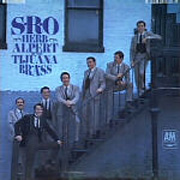Herb Alpert & The Tijuana Brass
S.R.O.
A&M SP-4119

Released as mono LP-119
Released on A&M CD in Japan as D32Y3087, and on Shout! Factory CD as DK 30858
Tracks:
SIDE ONE:
1. Our Day Will Come (Garson-Hilliard) 2:21
2. Mexican Road Race (Sol Lake) 2:30
3. I Will Wait For You (Jobim-Mendonca-Gimbel) 3:15
4. Bean Bag (Pisano-Wechter-Alpert) 1:58
5. The Wall Street Rag (Ervan Coleman) 2:25
6. The Work Song (N. Adderley-O. Brown, Jr.) 2:10
SIDE TWO:
1. Mame (Jerry Herman) 2:08
2. Blue Sunday (Julius Wechter) 2:49
3. Don't Go Breaking My Heart (B. Bacharach-H. David) 2:38
4. For Carlos (Pisano-Ceroli-Alpert) 2:46
5. Freight Train Joe (John Pisano) 2:37
6. Flamingo (Grouya-Anderson) 2:25
CREDITS:
PRODUCED BY: HERB ALPERT AND JERRY MOSS
ARRANGED BY: HERB ALPERT
ENGINEERED BY: LARRY LEVINE / GOLD STAR RECORDING STUDIOS
COVER PHOTO BY: GEORGE JERMAN
PHOTO COURTESY OF ALLENTOWN CALL-CHRONICLE / ALLENTOWN, PENNSYLVANIA
ALBUM DESIGNED BY: PETER WHORF GRAPHICS
Liner Notes:
S.R.O. Standing Room Only. The absolute, total, out-of-sight compliment for any performers. Big letters on a sign near the box office, telling you that every seat has been sold. Nothing left in the hall, the arena or the stadium but a little space for standees along the side walls or across the back. That sign has been getting a real workout. Herb Alpert and the Tijuana Brass have been a-touring. And it’s been TJB-SRO from L.A. to N.Y. and D.C. to the U.K. The seven gents on the flipside of this jacket, with their high-starched collars and their piped lapels and their uniquely happy sounds, have been on the road, getting to know in person some of the millions who know them from radio, television and records. It was seven SRO nights at Los Angeles’ Greek Theatre (the all-time attendance figure shattered), SRO at the Forest Hills Music Festival, likewise in Washington, London, Paris, Frankfurt and several itineraries’ worth of other places. And now here are the latest sensational recorded offerings (put them all together, they spell more SRO from Herb Alpert and the TJB. This septet rakishly outfitted – for whom the cover photographer could find standing room only – includes leader Herb Alpert and, looking upright behind him: Lou Pagani, piano; John Pisano, guitar; Bob Edmondson, trombone; Tonni Kalash, trumpet; Nick Ceroli, drums; and Pat Senatore, bass guitar. Happy listening…wherever you’re sitting.
CHUCK CHAMPLIN
LOS ANGELES TIMES
[EDIT to fix a very slight typo in the poll question line.]
S.R.O.
A&M SP-4119

Released as mono LP-119
Released on A&M CD in Japan as D32Y3087, and on Shout! Factory CD as DK 30858
Tracks:
SIDE ONE:
1. Our Day Will Come (Garson-Hilliard) 2:21
2. Mexican Road Race (Sol Lake) 2:30
3. I Will Wait For You (Jobim-Mendonca-Gimbel) 3:15
4. Bean Bag (Pisano-Wechter-Alpert) 1:58
5. The Wall Street Rag (Ervan Coleman) 2:25
6. The Work Song (N. Adderley-O. Brown, Jr.) 2:10
SIDE TWO:
1. Mame (Jerry Herman) 2:08
2. Blue Sunday (Julius Wechter) 2:49
3. Don't Go Breaking My Heart (B. Bacharach-H. David) 2:38
4. For Carlos (Pisano-Ceroli-Alpert) 2:46
5. Freight Train Joe (John Pisano) 2:37
6. Flamingo (Grouya-Anderson) 2:25
CREDITS:
PRODUCED BY: HERB ALPERT AND JERRY MOSS
ARRANGED BY: HERB ALPERT
ENGINEERED BY: LARRY LEVINE / GOLD STAR RECORDING STUDIOS
COVER PHOTO BY: GEORGE JERMAN
PHOTO COURTESY OF ALLENTOWN CALL-CHRONICLE / ALLENTOWN, PENNSYLVANIA
ALBUM DESIGNED BY: PETER WHORF GRAPHICS
Liner Notes:
S.R.O. Standing Room Only. The absolute, total, out-of-sight compliment for any performers. Big letters on a sign near the box office, telling you that every seat has been sold. Nothing left in the hall, the arena or the stadium but a little space for standees along the side walls or across the back. That sign has been getting a real workout. Herb Alpert and the Tijuana Brass have been a-touring. And it’s been TJB-SRO from L.A. to N.Y. and D.C. to the U.K. The seven gents on the flipside of this jacket, with their high-starched collars and their piped lapels and their uniquely happy sounds, have been on the road, getting to know in person some of the millions who know them from radio, television and records. It was seven SRO nights at Los Angeles’ Greek Theatre (the all-time attendance figure shattered), SRO at the Forest Hills Music Festival, likewise in Washington, London, Paris, Frankfurt and several itineraries’ worth of other places. And now here are the latest sensational recorded offerings (put them all together, they spell more SRO from Herb Alpert and the TJB. This septet rakishly outfitted – for whom the cover photographer could find standing room only – includes leader Herb Alpert and, looking upright behind him: Lou Pagani, piano; John Pisano, guitar; Bob Edmondson, trombone; Tonni Kalash, trumpet; Nick Ceroli, drums; and Pat Senatore, bass guitar. Happy listening…wherever you’re sitting.
CHUCK CHAMPLIN
LOS ANGELES TIMES
[EDIT to fix a very slight typo in the poll question line.]











 )
)